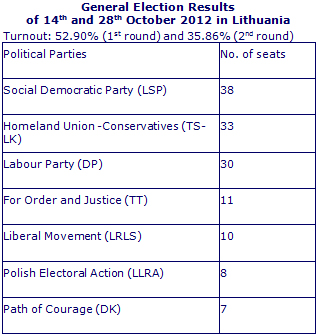Results
News
Corinne Deloy,
Fondation Robert Schuman,
Helen Levy
-

Available versions :
EN

Corinne Deloy
Fondation Robert Schuman
Helen Levy
The leftwing confirmed their first round victory in the general elections that took place on 14th October during the second round on 28th October in which 68 of the 141 seats in the Seimas, the only chamber of Parliament, remained to be taken. No second round has ever really modified the results of the first in the country's history.
The Social Democratic Party (LSP) led by Algirdas Butkevicius won with 38 seats. He pulled ahead of the Homeland Union-Conservatives (TS-LK) led by the Prime Minister, Andrius Kubilius which won 33 seats. "Our results are not bad, we form part of the main parties in parliament" declared the outgoing head of government. The Labour Party (DP) led by billionaire Viktor Uspaskich came third with 30 MPs and For Order and Justice (TT) of former President of the Republic (2003-2004) Rolandas Paksas, won 11 seats. The Social Democrats and Labour have won 78 of the 141 seats.
"I see these results in a positive light. After the second round we are in the lead," declared Algirdas Butkevicius in whom many see the future Prime Minister. In all likelihood the Social Democrats will ally themselves with the Labour Party and For Order and Justice in a government coalition. Viktor Uspaskich indicated that his party was interested in the Economy, Transport, Agriculture and Culture Ministries.
 Source: Central electoral commission of Lithuania: http://www.vrk.lt/2012_seimo_rinkimai/output_en/rinkimu_diena/rezultatai2.html
Source: Central electoral commission of Lithuania: http://www.vrk.lt/2012_seimo_rinkimai/output_en/rinkimu_diena/rezultatai2.html
The Liberal Movement (LRLS) led by Eligijus Masiulis, a member of the outgoing government, won 10 seats. Led by Waldemar Tomaszewski, Polish Electoral Action (LLRA), a party created in 1994 which represents the Polish minority in Lithuania, won 8 seats and the Path of Courage (DK) founded by former judge Neringa Venckiene 7 seats.
Turnout totalled 35.86% on 28th October, i.e. -17 points in comparison in the first round on 14th October (but +2,69 points in comparison with the second round of the general elections on 12th and 26th October 2008). "Sometimes voters do not find in the second round what they had in the first and do not think that the two remaining candidates can defend their interests," indicates Zenonas Vaigauskas, Chair of the Lithuanian Central Electoral Commission.
Last week demonstrations rallied several hundred students protesting against electoral fraud in the first round, notably regarding the purchase of votes in Vilnius. The first round of the elections in the constituency of Visaginas-Zarasai (North) was annulled by the Central Electoral Committee.
Outgoing Prime Minister Andrius Kubilius has paid the price of the austerity policy he introduced to counter the economic crisis that has seriously affected Lithuania (the national GDP contracted by 15% in 2009). The leftwing have promised to raise the minimum salary to 1,509 litas (437 €) – it lies at present at 850 litas – and to return to a progressive income tax rate (Lithuania has a flat tax of 15% on VAT, income and business tax).
"We must stimulate the Lithuanian economy, create jobs without spending money. We must increase revenues everywhere where it is possible and focus on sectors of the economy where wages are particularly low. There will not be a sharp fiscal reform nor a budgetary revolution," indicated Social Democratic leader Algirdas Butkevicius. The left has also promised to maintain a "responsible" budgetary policy. "Taking into account the financial market, EU membership and the European procedures to counter excessive deficits, the room to manoeuvre is limited. Any increase in the budgetary deficit will mean an increase in borrowing. As a result there will be no radical change in the policy undertaken," said the director of International Relations and Political Science in Vilnius, Ramunas Vilpisauskas. "The majority of the programme will remain on paper, the government will apologise and it will explain that it is difficult to keep promises in a coalition," he added.
The future Lithuanian government will have to continue the previous government's austerity policy and will have almost no room to manœuvre, since the country will have to borrow 7.6 billion litas (2.2 billion €) in 2013 – nearly 7% of its GDP – in order to refinance its debt. The country's GDP rose by 5.9% last year and it due to rise by 3% in 2012. Growth is being boosted by exports but domestic consumption is struggling to recover. Algirdas Butkevicius announced that Vilnius was due to adopt the single currency in 2015, one year before the date previously announced. Lithuania will therefore have to take care of its finances. The budgetary deficit, which totalled 9.4% of the GDP in 2009, was reduced to 5.5% last year, which is far too high a figure for the country to be able to adopt the euro given the criteria set by the Union. The future government will have to concentrate on setting up the Presidency of the European Union which Lithuania is due to ensure for the first time in its history in the second half of next year.
On the same theme
To go further
Elections in Europe
Corinne Deloy
—
25 February 2025
Elections in Europe
Corinne Deloy
—
18 February 2025
Elections in Europe
Corinne Deloy
—
28 January 2025
Elections in Europe
Corinne Deloy
—
14 January 2025

The Letter
Schuman
European news of the week
Unique in its genre, with its 200,000 subscribers and its editions in 6 languages (French, English, German, Spanish, Polish and Ukrainian), it has brought to you, for 15 years, a summary of European news, more needed now than ever
Versions :



